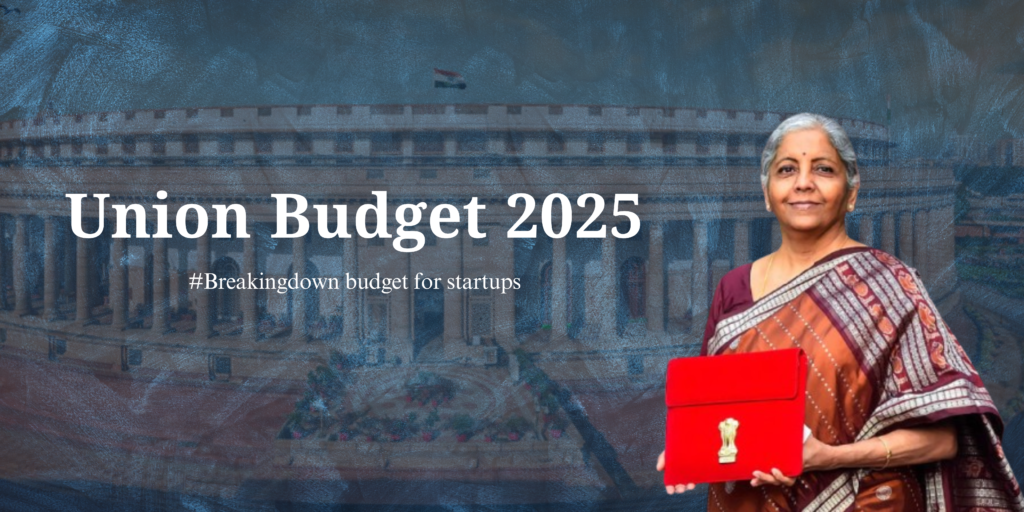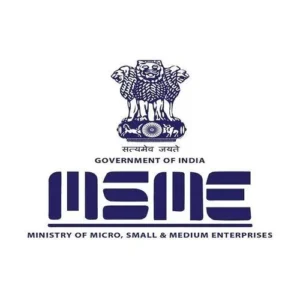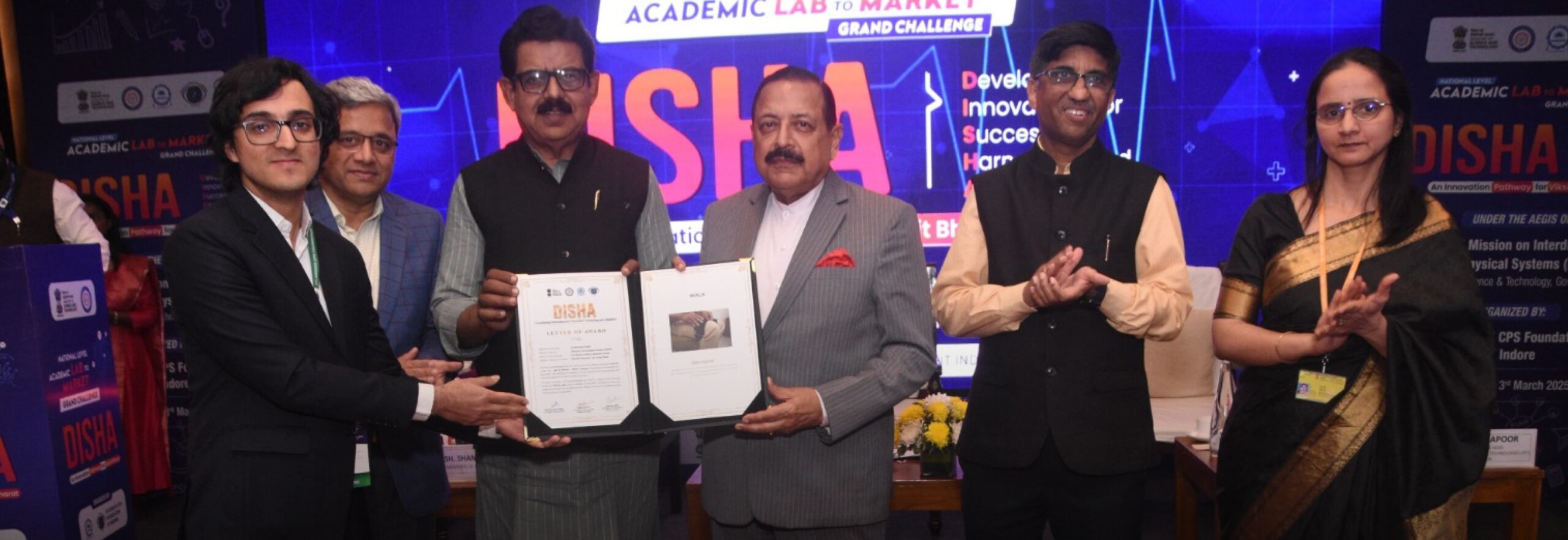
Synopsis
- The Union Budget 2025, presented by Hon’ble Finance Minister Nirmala Sitharaman on February 1, 2025, lays a strong foundation for India’s economic growth by focusing on four key pillars—agriculture, MSMEs, investment, and exports.
- This year’s budget strengthens the Startup Ecosystem by enhancing funding access, promoting deep tech innovation, and introducing simplified tax structures to ease financial burdens on individuals and businesses.
The tax exemptions for the middle class and income tax relief grabbed headlines. However, the budget also delivered major incentives for startups, MSMEs, and the Make in India initiative. - Additionally, income tax relief, capital gains tax reforms, venture capital funding, and extended tax exemptions are expected to benefit founders, investors, and MSMEs.
The government’s focus on AI skilling, deep-tech investments, and women entrepreneurship further reflects its commitment to building an inclusive and innovation-driven economy.
Expert Opinion

“This budget is a big win for India’s Startup Ecosystem. The ₹10,000 crore Fund of Funds, extended tax benefits, and regulatory reforms will provide the much-needed capital and ease of doing business for emerging ventures. The government’s focus on AI skilling and empowering first-time entrepreneurs—especially women and SC/ST founders—will further facilitate inclusivity and provide opportunities in India’s innovation landscape.” - Shashvat Nakrani, Founder, BharatPe
Key Highlights
- A Fresh ₹10,000 Crore Fund of Funds Scheme
- Govt to Explore Deep-Tech Fund of Funds
- Government Backs AI in Education with ₹500 Crore Centre of Excellence
- MSMEs Get Better Access to Credit
- Extension of Period of Incorporation for Startups
- New Loan Scheme for First-Time Women & SC/ST Entrepreneurs
Startup Shiksha will help you to understand how this year’s budget will impact Startup Ecosystem In India :
1. A Fresh ₹10,000 Crore Fund of Funds Scheme
A fresh ₹10,000 crore Fund of Funds (FFS) scheme is set to inject crucial capital into Indian startups, fostering a stronger innovation ecosystem and driving venture capital funding.
This initiative will provide financial backing to alternative investment funds (AIFs), which in turn support startup companies, ensuring wider access to investment opportunities.
With over ₹91,000 crore already committed by AIFs, this renewed funding push is expected to fuel high-growth sectors like deep-tech, EV battery technology, aerospace, and fintech.

This infusion of capital will play a pivotal role in nurturing entrepreneurship, attracting angel investors, and encouraging long-term capital gains.
This initiative aims to position India as a global leader in startup investment and innovation by strengthening the venture capital ecosystem.
2. Government to Explore Deep-Tech startups
The Indian government has announced plans to explore a Deep-Tech Fund of Funds to support capital-intensive and long-gestation startups in sectors like AI, space technology, and quantum computing.
While discussions about such a fund have been ongoing, this is the first official confirmation of the initiative.
Deep-tech startups require significant funding and patient capital due to their research-heavy nature and longer timeframes for commercialization.
To strengthen this ecosystem, In response, the Union Budget 2025 has allocated ₹20,000 crore for Research, Development, and Innovation (RDI), along with 10,000 fellowships under the PM Research Fellowship Scheme to boost technological research in IITs and IISc.

3. Government Backs AI in Education with ₹500 Crore Centre of Excellence
In a major push for AI-driven education, the government has allocated ₹500 crore to establish a Centre of Excellence (CoE) in Artificial Intelligence for Education.
This initiative builds on the three AI CoEs launched in 2023 for agriculture, healthcare, and sustainable cities.
The new centre will focus on advanced AI research, developing AI-based learning tools, and fostering industry-academia collaboration to enhance India’s education system.


The CoE will work on personalized learning solutions, automated assessments, and AI-powered tutoring systems, aiming to make education more adaptive and efficient.
Finance Minister Nirmala Sitharaman emphasized that these centres will serve as innovation hubs to develop AI solutions specifically for education.
Additionally, the IndiaAI Mission received a budget increase to ₹2,000 crore, signalling the government’s commitment to building indigenous AI capabilities.
Beyond AI, the budget also includes infrastructure expansion at five IITs (Bhilai, Dharwad, Goa, Jammu, and Tirupati), increasing their capacity by 6,500 students.
4. MSMEs Get Better Access to Credit
The Union Budget 2025 brings key reforms to strengthen Micro, Small, and Medium Enterprises (MSMEs) by enhancing credit access and fostering business growth.
The investment and turnover limits for MSME classification have been increased, allowing businesses to scale while continuing to benefit from government schemes.
To improve financing, the Credit Guarantee Scheme has been expanded, doubling the guaranteed cover to ₹10 crore for Micro & Small Enterprises and ₹20 crore for startups, ensuring greater capital availability.
Exporter MSMEs can now avail term loans up to ₹20 crore under guarantee support, boosting their global competitiveness. Additionally, the government has introduced Credit Cards for Micro Enterprises with a ₹5 lakh limit, providing seamless access to working capital.
These measures collectively aim to drive MSME expansion, enhance job creation, and strengthen India’s manufacturing and export sectors.

5. Extension of Period of Incorporation for Startups
Finance Minister Nirmala Sitharaman has extended the tax benefit window for startups under Section 80-IAC of the Income Tax Act to April 1, 2030. This move gives eligible startups five more years to claim tax holidays, capital gains exemptions, and investment tax reliefs.
Previously, only startups incorporated between April 1, 2016, and March 31, 2024, were eligible. The 2024 budget extended this to March 2025, and now, the deadline has been pushed further to March 31, 2030.
6. New Loan Scheme for First-Time Women & SC/ST Entrepreneur

The Union Budget 2025-26 has introduced a landmark scheme to support first-time women entrepreneurs and individuals from SC/ST communities.
With this initiative, the government will provide term loans of up to ₹2 crore to 5 lakh entrepreneurs over the next five years, easing access to capital for those who traditionally face credit challenges.
Announcing the scheme, Finance Minister Nirmala Sitharaman emphasized its role in breaking financial barriers and promoting self-employment.
Furthermore, by offering concessional funding, the initiative aims to empower marginalized communities, drive enterprise growth, and foster inclusive economic progress.
Conclusion
The Union Budget 2025-26 reinforces India’s commitment to fostering a thriving startup ecosystem by extending tax benefits, expanding funding avenues, and introducing targeted support for women and marginalized entrepreneurs.
With initiatives like the ₹10,000 crore Fund of Funds, deep tech investment push, and easier credit access for MSMEs, the government is laying the groundwork for a more inclusive, innovation-driven economy.
As India continues its startup revolution, these reforms promise to unlock new opportunities, fuel entrepreneurial ambitions, and accelerate economic growth.










